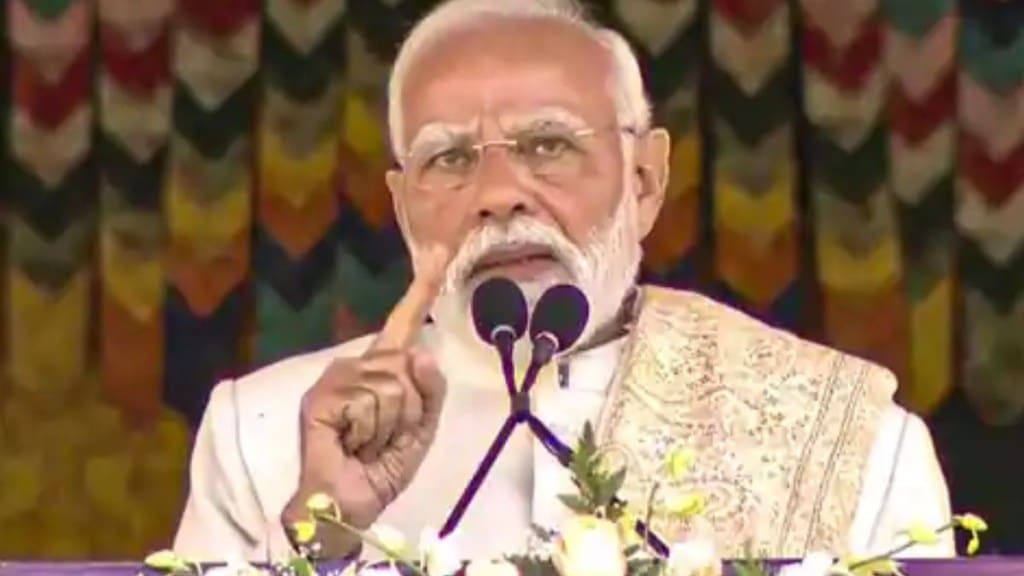If you heard a narrator read the speech, you would have thought that the words belonged to Bal Gangadhar Tilak or Jawaharlal Nehru or Jayaprakash Narayan or Nelson Mandela, and you would be wrong. The speaker was the honourable prime minister, Mr Narendra Modi.
The words will be music to reporters who have tried, in vain for 11 years, to extract a press conference from the prime minister; they may hope, finally, Mr Modi will break his resolve not to answer questions from journalists at a live, televised press conference. The words would reassure editorial writers that they need not be perpetually on guard and write ‘balanced’ editorials sprinkled with phrases like ‘on the one hand’ and ‘on the other hand’. The words will motivate the naughty artist to take out his pencils and draw cartoons ‘sparing no one, not even the prime minister’. The words will be a shot in the arm for editors who have ‘buried’ numerous stories with a prayer ‘Reader forgive me for I know what I do’.
Saluting courage
Mr Modi’s words were indeed inspiring. Ramnath Goenka’s motto was Journalism of Courage. That became the motto of the newspaper that he founded with the same words adorning the masthead every day. Eulogising Ramnath Goenka, the prime minister said:
‘Ramnathji took a firm stand against British tyranny. In one of his editorials he said that he would prefer to shut down his newspaper rather than follow British orders. Similarly, when an attempt was made to enslave the country again in the form of the Emergency, Ramnathji stood strong. And this year marks 50 years since the Emergency was imposed.’
Well said, but what is the reality of the media today? India’s prominent newspapers were forged in the furnace of the freedom struggle. Not many people would have imagined that 78 years after Independence they would have to invent the phrase godi media.Even as readers and viewers desert them in the thousands, many newspapers and channels flourish thanks to government patronage.
Mr Modi went on to say, ‘Fifty years ago, The Indian Express showed that even blank editorials can challenge the mentality that seeks to enslave… These stories tell us that Ramnathji always stood by the truth, always placed duty above everything else, no matter how powerful the forces standing against him were.’
The stark reality
The inspiring stories of the Fourth Estate have given way to a different genre of stories. For example, there is the story of an editor who was given a cheque for the salary for the remaining years of his contractual term of employment and told to clear out his desk by the end of the day. There is the story of an anchor who had the largest viewership on television, who was told to pack his bags when the owner of the channel changed in what is regarded in the industry as a midnight coup. There are shocking stories of famous journalists who lost their jobs in the last 10 years and cannot find a job even today.
A few days ago, Mr Yashwant Sinha told a story of a meeting at the Press Club of India to which he was invited to deliver a talk. After the address, while chatting with the journalists, he mildly admonished them for not publishing the remarks that he made occasionally. Everybody was silent, but a young journalist spoke up. He said, “Sir, I’ll report your remarks. If I lose my job, will you find me one?” Mr Sinha said he was stunned and simply stated, “Young man, please save your job.”
I have a story too: on a cold winter evening, I was having dinner with a journalist at a small restaurant. At about 10 pm, he got a call from his office. He was asked to go back to his residence immediately where an OB van was waiting. His assignment was to read a pre-prepared statement. He promptly excused himself and prepared to leave. I asked him why he did not decline the request and tell his boss to assign the job to another reporter who was already at home. He solemnly said, ‘I have a mother and father, both old and dependent on me, and I have an EMI on my house’. He left with profuse apologies.
Some journalists are driven by greed, and seem to thrive. Others are driven by fear, and survive. The greed-driven out-shout everyone in the business, scream and abuse, and invent outlandish stories. For example, during Operation Sindoor, some journalists broadcast the story that Indian naval ships had encircled Karachi port and Indian troops were poised to enter Karachi city!
Feardom or Freedom
The stories told by Mr Sinha and me — and others that you have heard — illustrate the fear that pervades throughout the Fourth Estate. Believe me, from what I have been told by informed people and what I have gathered, there is an invisible censor; there is 24×7 monitoring of all major newspapers and television channels; there are discreet telephone calls to the editors; there are advisories and, if they are ignored, there is trouble. Many stories are still-born, many are killed. It appears that the only media spared are the small media outlets in Indian languages — excluding the Hindi media.
Fear is the worst enemy of freedom. India can have either a fear-stricken Press or a free Press.

